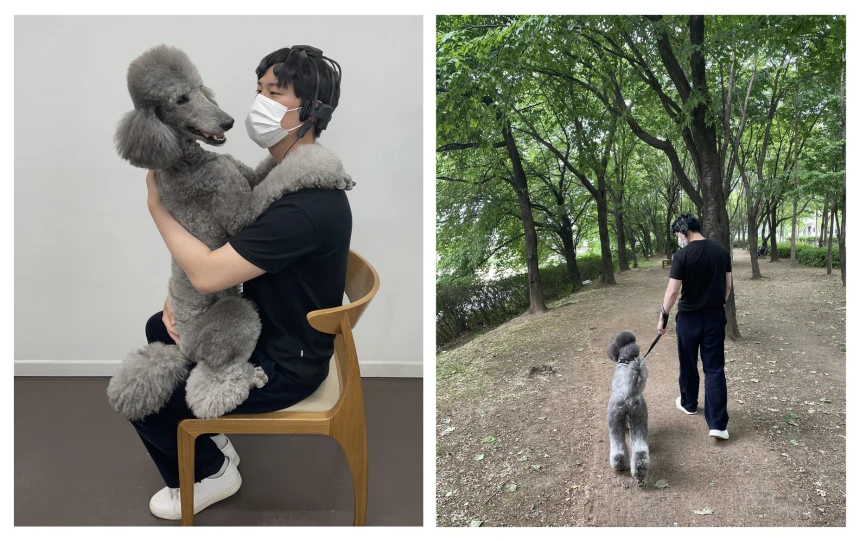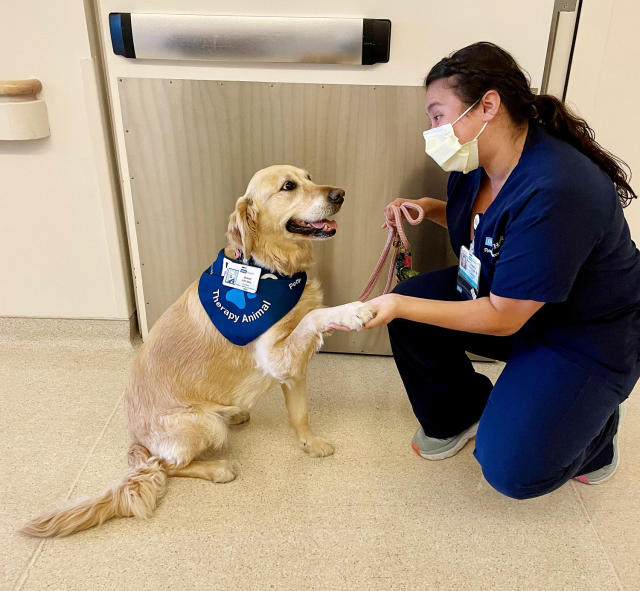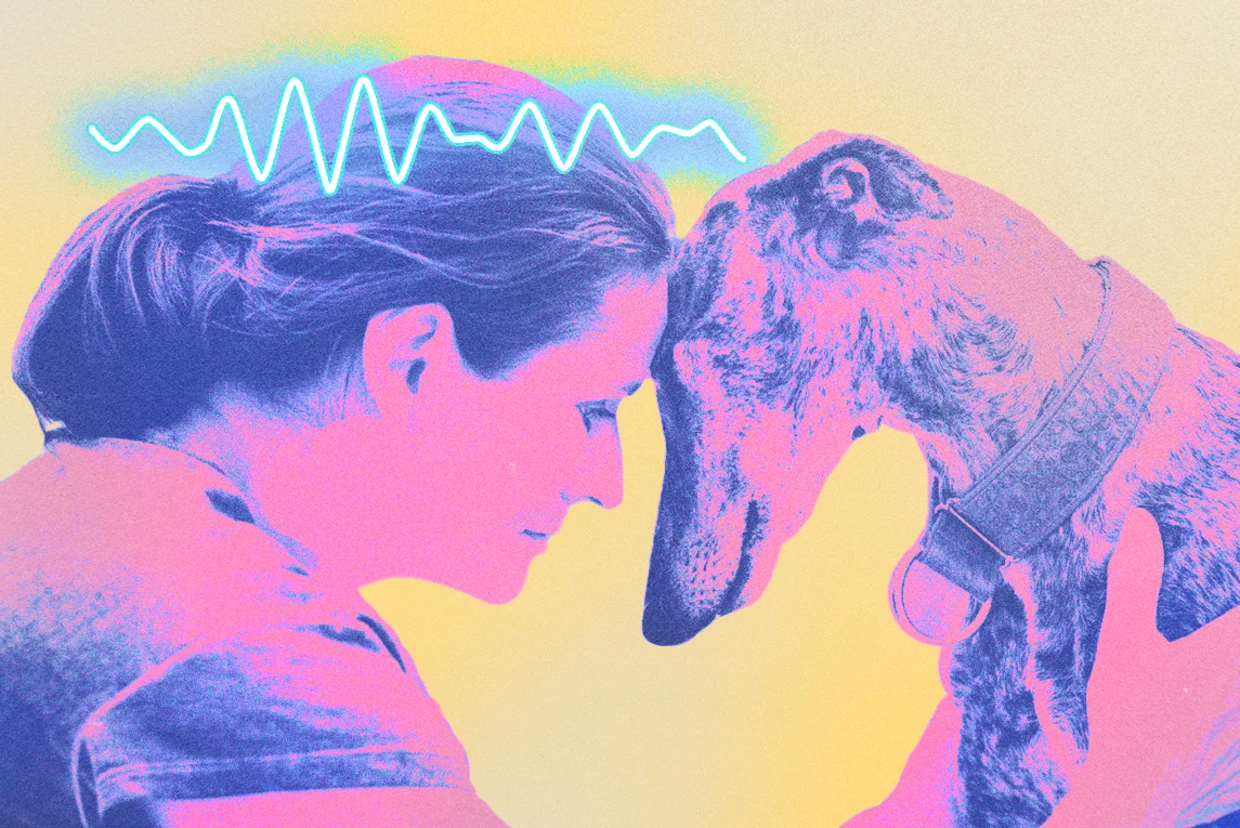In a study exploring brain activity, researchers found that various activities with a poodle had distinct effects on human well-being. Walking the poodle was associated with increased relaxation, while brushing the dog led to improved concentration. Interestingly, playing with the poodle was found to have both relaxation and concentration-enhancing effects, offering a comprehensive boost to mental well-being.
Amidst the wealth of research exploring the profound connection between humans and their furry companions, a new study delves deeper into the intricacies of this bond. Beyond the well-documented benefits such as mood enhancement and stress reduction, this study seeks to unveil the nuanced effects of specific interactions with dogs on the human brain.
Published recently, the study conducted by researchers in South Korea takes a novel approach. Equipping 30 adults with headsets adorned with electrodes, the researchers meticulously monitored changes in brainwave patterns as participants engaged with a charming poodle named Aro. The findings unveiled a fascinating correlation: various activities with Aro elicited distinct mental responses among the participants. Walking the dog induced a profound sense of relaxation, while brushing her fur heightened concentration. Remarkably, playing with Aro yielded both of these effects, underscoring the multifaceted impact of canine companionship on human cognition.
Onyoo Yoo, lead author of the study and a researcher at Konkuk University in South Korea, emphasized the significance of their findings. “Previous studies often offer a holistic view, examining mood or hormone levels before and after dog interactions,” noted Yoo. “However, our study unveils a crucial aspect—certain activities with dogs can trigger specific brain activity.”
Published in the esteemed journal PLOS ONE, the study’s methodology included eight distinct activities, each lasting three minutes: meeting, playing, feeding, massaging, grooming, photographing, hugging, and walking with the affable 4-year-old poodle, Aro. This innovative study not only deepens our understanding of the human-dog bond but also sheds light on the intricate interplay between canine companionship and brain function.

During the activities, participants wore brainwave-detecting headsets and afterward completed surveys detailing their emotional experiences.
Analysis revealed that participants’ alpha brain waves, indicating stability and relaxation, notably intensified during interactions with Aro involving play with squeaky toys and leisurely walks along park trails. These findings suggested an enhanced state of restfulness and relaxation among participants.
Moreover, beta brain waves, associated with attention and concentration, became notably stronger during activities such as playing with Aro, brushing her, or giving her a gentle massage. This indicated an improvement in participants’ concentration without an accompanying increase in stress levels.
Following all eight activities, participants reported reduced feelings of stress, fatigue, and depression. Particularly, activities such as massaging Aro, feeding her treats, and hugging her were noted to significantly uplift participants’ moods, as per the surveys. Additionally, participants expressed feeling comfortable during walks with Aro and relaxed while engaging in massage sessions with her.
“This study demonstrates that specific interactions with dogs can elicit stronger feelings of relaxation, emotional stability, attention, concentration, and creativity by stimulating increased brain activity,” remarked Yoo. “Furthermore, interactions with dogs can alleviate stress and evoke positive emotional responses.”
Previous research has hinted at the potential benefits of canine companionship in alleviating symptoms of depression or post-traumatic stress disorder (PTSD). However, the efficacy of such interventions remains uncertain.
A study in 2022 revealed that veterans and first responders with service dogs experienced fewer PTSD symptoms compared to those without, although pet ownership of dogs was found to be less effective.
Similarly, a clinical trial in 2020 found that service dogs were marginally more effective in alleviating PTSD symptoms among veterans compared to emotional support dogs, which lacked specific training tasks such as turning on lights or retrieving objects. Nonetheless, both types of dogs exhibited some degree of improvement in PTSD symptoms.

Further studies underscore the necessity for individuals to have a natural fondness for animals to fully reap the benefits of pet therapy.
Reflecting on her own experiences, Kathryn Magruder, a psychiatry professor at the Medical University of South Carolina and co-author of a 2020 trial, shared, “I was actually traumatized at a very young age by a dog. I never quite warmed up to them, so I’m not sure I would necessarily find the same comfort level.”
Jennifer Dobkin, who spearheads the animal therapy program at UCLA People-Animal Connection, attests to the profound impact of canine companionship. “If it’s a staff member that’s been stressed and having a bad day, you can physically see their posture relaxes. They smile. They’ll say things to us like, ‘You have no idea how much I needed this,'” she recounted.
Dobkin recounted a touching moment when she brought her own terrier mix, Toto, to visit a family in the hospital amidst their hardship. Despite their grief, the family found solace in the simple act of interacting with a dog, offering them a temporary respite from their sorrow.
At Stuart House, a center in Santa Monica, California, dedicated to supporting sexually abused youth, children find solace in the presence of a Golden Retriever/Labrador mix named Norse while conversing with investigators. “Our dogs are called upon to assist in such situations, aiding the children in coping with discussing extremely stressful experiences,” Dobkin shared. “I believe it helps them maintain focus and provides a source of comfort.”
